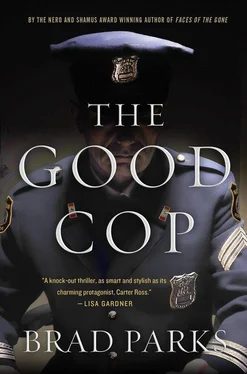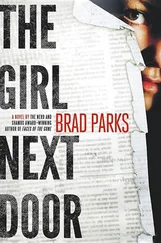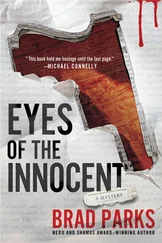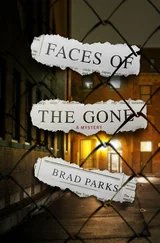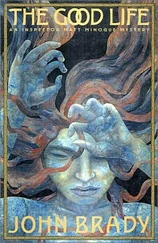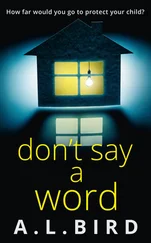Brad Parks - The Good Cop
Здесь есть возможность читать онлайн «Brad Parks - The Good Cop» весь текст электронной книги совершенно бесплатно (целиком полную версию без сокращений). В некоторых случаях можно слушать аудио, скачать через торрент в формате fb2 и присутствует краткое содержание. Год выпуска: 2013, ISBN: 2013, Издательство: Minotaur Books, Жанр: Триллер, на английском языке. Описание произведения, (предисловие) а так же отзывы посетителей доступны на портале библиотеки ЛибКат.
- Название:The Good Cop
- Автор:
- Издательство:Minotaur Books
- Жанр:
- Год:2013
- ISBN:9781250005526
- Рейтинг книги:3 / 5. Голосов: 1
-
Избранное:Добавить в избранное
- Отзывы:
-
Ваша оценка:
- 60
- 1
- 2
- 3
- 4
- 5
The Good Cop: краткое содержание, описание и аннотация
Предлагаем к чтению аннотацию, описание, краткое содержание или предисловие (зависит от того, что написал сам автор книги «The Good Cop»). Если вы не нашли необходимую информацию о книге — напишите в комментариях, мы постараемся отыскать её.
The Good Cop — читать онлайн бесплатно полную книгу (весь текст) целиком
Ниже представлен текст книги, разбитый по страницам. Система сохранения места последней прочитанной страницы, позволяет с удобством читать онлайн бесплатно книгу «The Good Cop», без необходимости каждый раз заново искать на чём Вы остановились. Поставьте закладку, и сможете в любой момент перейти на страницу, на которой закончили чтение.
Интервал:
Закладка:
My destination was the Clinton Hill section of Newark and my man, Reginald “Tee” Jamison. The nickname came from the thriving T-shirt shop he ran-no one, other than perhaps his wife, called him by his real name. I had written a story about him a few years back, and we had since become unlikely friends. I say “unlikely” only in a statistical sense, inasmuch as there are roughly two hundred million white people living in America, and Tee is friends with only two of them.
Still, I was glad to be one of the two. Despite the superficial differences between us-he has more hair in two of his dreadlocks than I have on my entire head, not to mention more muscle in one of his pectorals than I have in my entire body-we were kindred spirits in more ways than not, and we enjoyed deciphering our respective worlds for each other.
Plus, he grew up in Newark, shuffling between a variety of foster care placements in all parts of the city, so he has a network of contacts that would make any reporter envious. If Darius Kipps was dirty, Tee might or might not know it. But he sure would know someone who knew.
I arrived at his store to find a half-dozen knuckleheads hanging around his front door. They were generally good kids-if you could ignore the pot smell that clings to their clothing-though their presence on Tee’s sidewalk led people to make certain assumptions about what was going on inside. Tee, who was a legitimate businessman, finally got fed up one day and posted a sign in his front window, NO, WE DO NOT SELL WEED HERE.
As I got out of my car, six heads immediately swung my way-well-dressed Caucasian men tend to have this effect on Clinton Avenue in Newark-but then they saw it was me. I’m a frequent enough visitor to Tee’s store that they know I’m not there to arrest them, harass them, or otherwise disrupt their mojo. With their alarm level back down, they returned to what appeared to be a dice game. And not Dungeons amp; Dragons.
I hit the buzzer by Tee’s front door and waited for the lock to release. When I walked in, Tee was designing a T-shirt for a pair of customers, who were seated in front of his desk.
“Uh-oh, it’s the IRS!” he hollered from behind his desk.
“Sir, this is a random audit,” I said, playing along. “I’m going to have to ask for your last five years of returns, including all associated receipts.”
“Receipts? What’s that? You know a brother like me can’t read. My massa won’t let me.”
“Well then, I’m afraid we’re going to have to throw you in jail with all the other darkies. Now excuse me for a second, I have to plant some drugs on you.”
“C’mon now, don’t make me go all Rodney King on your pasty ass.”
I think the customers knew we were kidding because we were both smiling broadly. But they looked like nice folks, and I could tell we were making them feel uncomfortable. So I pulled out of the act and said, “You want me to come back later?”
“No, no, I’m just finishing. Gimme a second.”
Tee took another five minutes wrapping up with his customers, while I perused some of his inventory, including the ever-popular shirt that showed a stick figure lying on the ground under the words, WHY DON’T YOU GO PRACTICE FALLING DOWN?
I was admiring another one-a top-ten list of “Yo Mama’s So Ugly” jokes-when Tee came over and shook my hand.
“So what’s going on?” Tee asked. “You working on something?”
I told him what I knew about Darius Kipps, finishing with, “So, basically, I need to figure out if he’s crooked.”
“Oh, that’s easy,” Tee said. “They all crooked.”
I had repeatedly tried to convince Tee of my belief that, in fact, the vast majority of policemen are not corrupt-in the same way the vast majority of newspaper reporters don’t make up stories. But it only takes a few reprobates to skew the reputation of the rest of them. Newark, for example, had roughly 1,200 police officers last time I checked. If even 99 percent of them were law-abiding, that still meant there were a dozen cops rampaging around the city, wreaking havoc.
Alas, it seems like Tee had experience with all twelve of them.
“C’mon, I’m serious,” I said. “I’ve got a picture of him. You think your friends outside are hard-core enough to know if Kipps was involved in something he shouldn’t be?”
“Them? Nah. They just playin’, you know what I mean?”
I did. In Newark, there were pretend gangs and then there were serious gangs, and it was important to know the difference. Kids like Tee’s knuckleheads might call themselves a gang. They might adopt some of the gestures, mannerisms, and clothing of a gang. They might even say they were Bloods or Crips. But, in reality, they were a gang in roughly the same sense as the Little Rascals. They hung together for camaraderie and mutual protection. They were basically harmless.
“Besides,” Tee pointed out, “you said this guy is Fourth Precinct, right? Those kids never get out of the South Ward. The Fourth is up in Central.”
“Oh, yeah, good point. You know anyone up that way who might be able to help me?”
Tee got a far-off look.
“What?” I asked.
“Well, I know these dudes up there. Trust me, if your cop was dirty, they’d know. They got that neighborhood wired. Hell, I think they got the whole city wired.”
“Okay. I’m not going to have to get stoned again, am I?”
Tee had once set me up with sources who felt the only way to ensure I was not a member of a law enforcement agency was for me to smoke pot with them. It was an experience that proved two things to them: one, I’m not a cop; and two, my tolerance for marijuana is not especially impressive.
“No, no, nothing like that this time,” he assured me. “But let me ask you something: You need a new pair of boots by any chance?”
“Huh?”
“Just say yes.”
“Yes?”
“Okay, let me make a call.”
* * *
Fifteen minutes later, I was out the door with an address scribbled on a piece of paper and instructions to stop at an ATM machine to pick up a hundred dollars in cash. I was also instructed not to get too attached to said money.
The address was on Irvine Turner Boulevard, which was one of Newark’s most notorious drug corridors for one reason: it offered a straight shot to Route 78, an east-west interstate that led rather quickly to some of the state’s nicest bedroom communities. All the suburbanites who came to Newark to get their drugs-and make no mistake, that was a big part of the clientele-knew they couldn’t get lost if they just stayed on Irvine Turner.
I relied on my GPS to guide me to the address Tee had written for me, which turned out to be around the corner from the Fourth Precinct headquarters. It was a cream-colored, two-story, warehouselike building that encompassed a good chunk of the block. The only apparent tenant, and it occupied perhaps one-tenth of the building, was a bodega that had a door onto the street. It had dark windows-behind bars, of course-made of one-way glass, the kind that would allow someone inside to see out, but not the other way around.
Where was Tee taking me, anyhow? I pushed through the bodega’s door to the sound of little bells chiming-a few had been tied to the door. The store was empty except for a turban-wearing cashier sitting in a bulletproof box.
I approached the man, who I guessed was Sikh, and said, “Tee sent me.”
He tilted his head and peered at me like I was speaking a soon-to-be-extinct Javanese dialect.
“I’m the guy Tee sent,” I said.
More peering.
“Is this one-sixty Irvine Turner Boulevard?” I asked.
“One-sixty A,” the guy said in a thick Indian accent. “You want one-sixty, you go around the corner.”
“Around … which corner?”
Читать дальшеИнтервал:
Закладка:
Похожие книги на «The Good Cop»
Представляем Вашему вниманию похожие книги на «The Good Cop» списком для выбора. Мы отобрали схожую по названию и смыслу литературу в надежде предоставить читателям больше вариантов отыскать новые, интересные, ещё непрочитанные произведения.
Обсуждение, отзывы о книге «The Good Cop» и просто собственные мнения читателей. Оставьте ваши комментарии, напишите, что Вы думаете о произведении, его смысле или главных героях. Укажите что конкретно понравилось, а что нет, и почему Вы так считаете.
